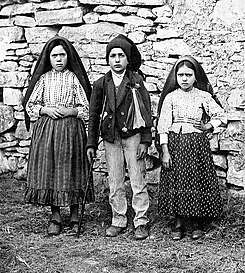Catholic Church in Portugal
The Catholic Church in Portugal is part of the worldwide Catholic Church, under the spiritual leadership of the Pope in Rome. The Catholic Church is the world's largest Christian organisation. It is Portugal's largest religion and its former state religion, and has existed in the territory since the Iberian Peninsula was ruled by the Roman Empire.
Catholic Church in Portugal | |
|---|---|
| Portuguese: Igreja Católica em Portugal | |
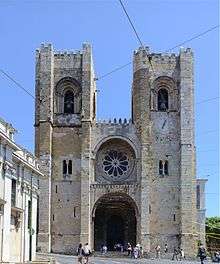 | |
| Type | National polity |
| Classification | Catholic |
| Orientation | Christianity |
| Scripture | Bible |
| Theology | Catholic theology |
| Governance | Episcopal Conference of Portugal |
| Pope | Francis |
| Primate | Jorge Ortiga |
| Patriarch of Lisbon | Manuel III |
| Apostolic Nuncio | Ivo Scapolo |
| Region | Portugal |
| Language | Portuguese, Latin |
| Headquarters | Lisbon Cathedral |
| Founder | St. Peter of Rates |
| Origin | 44 A.D. Lusitania, Roman Empire |
| Official website | Episcopal Conference of Portugal |
| Part of a series on the |
| Catholic Church |
|---|
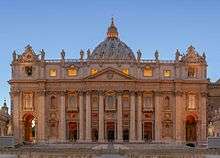 |
| Overview |
|
Miscellaneous
Relations with: |
|
|
There are an estimated nine million baptised Catholics in Portugal (84% of the population) in twenty dioceses, served by 2789 priests. Although a large number wish to be baptized, married in the church, and receive last rites, only 19% of the national population attend Mass and take the sacraments regularly.
In 2010, the average age of priests was 62.[1] In 2012 88% of the Portuguese population considered themselves culturally Catholic in a commissioned survey of religious attitudes sponsored by a Christian organization.[2]
History
Catholicism was introduced to what is now Portugal under the Roman Empire in the first half of the first millennium AD. The modern Portuguese state was founded in 1139 by Afonso Henriques during the Reconquista, in which the Catholic kingdoms of the northern Iberian Peninsula reconquered the South from the Islamic Moors. Crusaders from other Catholic realms aided the reconquest, which Portugal finished in 1249.
Exploration and the creation of the Portuguese Empire from the early 15th century onward spread Catholicism to Portuguese colonies in Africa, Asia and South America. The Lusophone countries of Angola, Brazil, Cape Verde, Mozambique, São Tomé e Principe and Timor-Leste all have Catholic majorities as a result.[3] The state of Goa, India, was also part of the Portuguese Empire and a large Goan Catholic minority remains.[4]
The Portuguese Republic, established in 1910, abolished Catholicism as state religion.[5] The right-wing Estado Novo regime from 1932 to 1974 re-established state Catholicism, which was subsequently disestablished along with the regime.[6]
Organization
Within Portugal, the hierarchy consists of archbishops and bishops. At the top of the hierarchy is the archbishop who is known as the Patriarch of Lisbon. The remainder of the dioceses of Portugal, each headed by a bishop, includes:
- Lisbon (with the dignity of Patriarchate)
- Angra
- Funchal
- Guarda
- Leiria-Fátima
- Portalegre-Castelo Branco
- Santarém
- Setúbal
- Braga
- Évora
Sites
Portugal is also the location of one of the major Catholic shrines and Marian pilgrimage sites, in the city of Fátima, in the municipality of Ourém, honoring Our Lady of Fátima.
The northern city of Braga is an important Catholic center. A Portuguese saying which lists characteristics of different cities states that "Braga prays".[7] Besides Braga Cathedral, it also has the sanctuary of Bom Jesus do Monte.
One of the routes on the Way of St. James, a major Catholic pilgrimage to the Cathedral of Santiago de Compostela in Galicia, Spain, is the Portuguese route (Portuguese: Caminho Português), starting from Lisbon Cathedral and spanning 610 km. Among those who have taken it was Queen Isabel of Portugal, who was canonized, in the 14th century.[8]
Portuguese Popes
Two popes have been born in what is now Portugal, although only the latter was ever a subject of a country by that name. Damasus I was born in what is now Portugal in 306, and his reign as pope from 366 to 384 saw the Scriptures translated to Latin. He is now a Saint, with his feast celebrated on December 11.[9]
Pedro Julião, born in Lisbon around 1215, led the church as Pope John XXI from 1276 to 1277.
Gallery
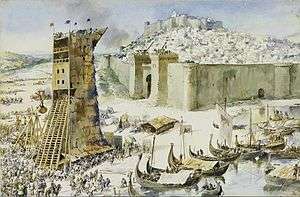 The Siege of Lisbon in 1147, part of the Reconquista
The Siege of Lisbon in 1147, part of the Reconquista- Lisbon Cathedral is the seat of the Patriarch of Lisbon
 Pope Saint Damasus I was from Roman Lusitania, now Portugal
Pope Saint Damasus I was from Roman Lusitania, now Portugal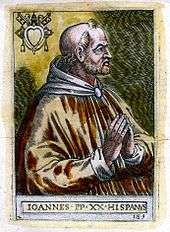 Pope John XXI, born in Lisbon in c. 1215
Pope John XXI, born in Lisbon in c. 1215
See also
References
- "Pope's Trip Highlights Changing Face of Europe's Catholics". 2010-06-20. Archived from the original on 2010-06-20. Retrieved 2019-03-17.
- EuroBarometer
- https://www.cia.gov/library/publications/the-world-factbook/fields/2122.html#po
- "Archived copy". Archived from the original on 2013-07-23. Retrieved 2013-08-15.CS1 maint: archived copy as title (link)
- Souza, Teotonio R. de. "The Portuguese Saints: St Teotonio to St Nuno". Cite journal requires
|journal=(help) - "Culture of Portugal - history, people, clothing, traditions, women, beliefs, food, customs, family". www.everyculture.com. Retrieved 2019-03-17.
- "Insight Guides". www.insightguides.com. Retrieved 2019-03-17.
- "Archived copy". Archived from the original on 2014-09-11. Retrieved 2014-03-05.CS1 maint: archived copy as title (link)
- Online, Catholic. "Pope Saint Damasus I - Saints & Angels". Catholic Online. Retrieved 2019-03-17.
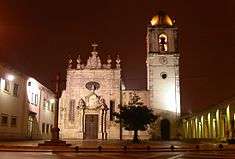
.svg.png)
